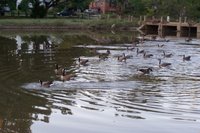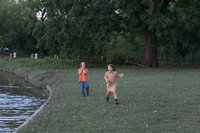

My children enjoyed scaring away all the ducks at Bryan Park! :)
I found a topic for the day!
At the NAMTA (North American Montessori Teacher Association) Conference in Atlanta last January, the keynote speaker, Richard Louv addressed what he coined as a "Nature Deficit Disorder."
Here's a quote from Louv on the Nature Deficit Disorder:
"It's the cumulative effect of withdrawing nature from children's experiences, but not just individual children. Families too can show the symptoms -- increased feelings of stress, trouble paying attention, feelings of not being rooted in the world. So can communities, so can whole cities. Really, what I'm talking about is a disorder of society -- and children are victimized by it."
I've been slowing reading Louv's book Last Child in the Woods for a few months now. He raises some interesting points about how our society is limiting the interaction between children and nature. He points out the litigation issues that often deprive children of nature. For one thing, our parks and play spaces for children have much more to do with limiting liability for injury than anything else. Here's another interview quote:
"For instance, I bring up the idea of the "criminalization" of natural play, where if you take all the state regulations, the well-intended and often needed environmental restrictions, and add those to the covenants and restrictions that now cover almost any new development that has been built in the last 20 years -- things that control everything to whether you can plant rosebushes in the front to what color your curtains -- well, the idea of a freewheeling, tree-house-building, nature-loving kid doesn't fit that. So if all of [these restrictions] were to be enforced, playing outdoors by kids would be essentially illegal. It's not all enforced, but the message still gets through -- kids get a sense that there's something unsavory about playing outdoors. And it's too easy to blame this on lazy parents who let the TV do the baby sitting, when the truth is there is a matrix of forces that have come together to create this problem, and those forces are hard to stand up against as an individual and as a people."
It's a bold statement that Louv makes-- that the symptoms of ADHD would be reduced in children if we put them back in the woods, back outdoors in a natural environment. So far there is evidence to support the claims that stress reduction, increased creativity, cognitive skills, and full use of the senses are the immediate benefits of being in nature. I share with many adults the same feeling of relief to be outdoors.
(One of my goals this year is to make it a regular part of my life to go hiking and camping with my family. )
So here's the question I think parents need to ask themselves: is it worth the risk of poison ivy, ticks or other common (and mostly avoidable) hazards to put children back in the woods? If the benefits are increased creativity, concentration, and to reduce stress, are these "less controlled" environments worth it?
It was this issue that inspired me to offer a nature themed camp over the summer. We definitely immersed ourselves more with nature. Campers found lizards, a toad, many insects, a bird's nest with eggs and a hatchling bird, wild blackberries, the farmer's fields of tomatoes, corn, sunflowers, etc. and collected apples and fresh food and flowers from nearby fields. We took nature walks almost every day and spent an hour outside if we could. We watered the garden and pulled weeds all summer. It was a taste of nature, but not quite on the level as the author's childhood memories of unstructured play, fort building, and tree climbing
The only bad part about this book so far-- no one needs another label or issue to obsess about! In our modern tendency to frantically overschedule, is this just one more thing to stress over? I hope not. I hope it is a term that gives us permission to:
- take vacations
- go wild places
- relax
- play in the mud; get dirty, REALLY DIRTY with your child.
- have more fun outdoors!
Warmly,
Sarah
No comments:
Post a Comment